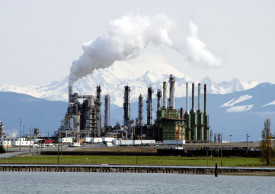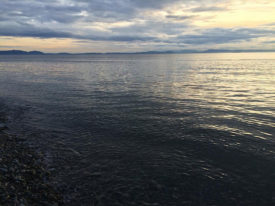Download a PDF of this press release.
Seattle, WA – British Columbia leads the Pacific Northwest in several critical long-term trends, including human health, energy efficiency, and smart growth, reported the Cascadia Scorecard, a regional progress report released today by Sightline Institute at http://scorecard.sightline.org.
“British Columbians live an average of two years longer than the residents of Washington and Oregon, and Vancouver sets the pace for the Northwest in creating pedestrian-friendly neighborhoods,” said Clark Williams-Derry, Sightline research director. “The province should be proud of its accomplishments.”
But although the province shines by Northwest standards, when compared with world leaders, BC doesn’t fare as well. “BC’s progress on economic security is mixed at best,” said Williams-Derry. “And British Columbians still use significantly more highway fuels and electricity in homes and offices than many other parts of the industrialized world.”
In addition, despite impressive growth in pedestrian-friendly neighborhoods in some parts of greater Vancouver, the latest Census data indicated the metro area as a whole fell behind in channeling growth into compact, walkable neighborhoods.
This latest update of the Cascadia Scorecard, a project launched by Sightline in 2004, found that overall, the Pacific Northwest—including Washington, Oregon, Idaho, and BC—is achieving modest progress towards goals of robust human health, shared economic prosperity, and a legacy of thriving nature.
Key findings for British Columbia from the 2009 Scorecard included:
- BC rises to a new high in health: British Columbia residents live an average of 81.6 years, two years longer than residents of the Northwest states and topping all other North American states and provinces. In fact, if BC were an independent nation, it would have the second longest lifespan in the world, after Japan, and be tied with Iceland. The healthiest jurisdiction in British Columbia is the suburban city of Richmond, BC, where lifespans exceed 84 years.
- Province’s smart-growth lead may be slipping: Within Cascadia, metropolitan Vancouver, BC, has long led the way in smart growth, with more residents in transit- and pedestrian-friendly neighborhoods than in comparable US cities. But the most recent Census held a surprise: Between 2001 and 2006, the pace of smart growth slowed. Compact neighborhoods accounted for just 56 percent of new urban and suburban development, compared with 67 percent during the 1990s. There was, however, impressive growth in pedestrian-friendly neighborhoods in some parts of the metro area during that time.
- BC bests Northwest states in personal energy efficiency: Largely because of the province’s success at creating compact communities that encourage walking and transit use, British Columbians use almost one third less energy per person than the Northwest states (counting highway fuels and electricity in homes and businesses). Per person, British Columbians cut back on gasoline use by nearly a tenth since 1998. But the province still uses about 50 percent more energy per person than world leaders such as Germany.
- Economic progress stalls: In 2006, the last year for which complete data were available, the province marked its fourth consecutive year of improved economic security. Yet the share of residents below the “low-income cutoff” was nearly the same as it was in 1990, while the percentage of children living below the low-income cutoff had grown by more than three percentage points.
- Lowest teen birthrate: Northwest teen birthrates rose in 2006 and again in 2007, a trend that broke a long-standing decline that had been underway since the 1990s. But BC boasts the region’s lowest teen birthrate by far—less than one-third that of the Northwest states.
Sightline’s Williams-Derry said that while British Columbia has performed better than the Northwest states overall, the province’s leaders should pay close attention to the areas where it needs improvement.
“If BC wants to safeguard its record in smart growth and climate action, policymakers should redouble their efforts to invest in compact communities where residents can walk, bike, and use transit for daily travel,” he said. “We’re confident that, with thoughtful leadership, the province can set a new standard for the Northwest in the 21st century.”
The Cascadia Scorecard not only tracks the region’s relative progress over time, but also compares the Northwest with world leaders in each trend. For example, the Scorecard calculates how long it would take Cascadia to do as well as Japan for health and Germany for energy efficiency.
This update finds that even if Cascadia makes steady improvements in all of the trends the Scorecard monitors, it won’t be until 2050 that the region matches places that have already racked up world-class performance.
With this update, the Cascadia Scorecard became an online resource, with all data, graphics, and sources at http://scorecard.sightline.org. Sightline Institute is an independent, Seattle-based nonprofit research and communications center that measures progress towards a sustainable economy and way of life in the Pacific Northwest, including British Columbia, Idaho, Oregon, and Washington.
More information:






